![]()

Get
all the evaluations for
the MAY
Release
Subscribe
to Vintage Assessments today
by Clicking
Here
This
not-for-profit website is dedicated to the discerning reader!
A
Sparkling Salute for Victoria Day
From
La Grande Dame to the Sekt of all Sekts!
National Post Weekly Wine & Spirits Columnist
Saturday, May 17, 2003
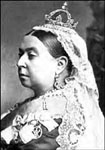 While most Canadians will be celebrating this weekend behind
their barbie, perhaps with an irreverent Aussi Shiraz, one might pause to
salute the woman who made it all possible. Yes, Queen Victoria would be
celebrating her 184th birthday next Saturday. Trying to find
the appropriate salutatory tipple turned out to be a bit of a chore,
although bubbly was high on my list.
While most Canadians will be celebrating this weekend behind
their barbie, perhaps with an irreverent Aussi Shiraz, one might pause to
salute the woman who made it all possible. Yes, Queen Victoria would be
celebrating her 184th birthday next Saturday. Trying to find
the appropriate salutatory tipple turned out to be a bit of a chore,
although bubbly was high on my list.
After all, no matter how you spell it, the Victorians were never prudish
about Sekt (German sparkling wine)! Indeed, it has been erroneously
suggested that Sekt was the favourite tipple of German Prince
Albert of Saxe-Coburg who was born at Schloss Rosenau in 1819. He married
Alexandrina Victoria after visiting London in 1839 and during their
18-year marriage, thanks to Sekt, managed to sire nine children. Certainly
a significant toast is in order when one considers that Queen Victoria
ruled from 1837 to 1901 and survived at least eight known assassination
attempts.
For a woman of such stature, my first choice would have been
a jeroboam of 1985 La Grande Dame Champagne
from the house of Veuve Clicquot-Ponsardin. Unfortunately, my cupboard is
bare - I shared my last bottle with Julia Child, another grande dame who
turns 91 this summer.
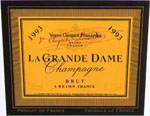 And while it may not be in quite the same vintage league,
there is the 1993 (a Vintages
Essential) at $144.95. This “marque” was created to honour Nicole-Barbe
Clicquot (née Ponsardin) who at the age of 27 and upon the death of her
husband in 1806 re-launched the family firm under the name of Veuve
(meaning widow) Clicquot-Ponsardin. Fortunately, this 1993 La Grande Dame Champagne is
definitely worth considering, especially if you enjoy an elegant, seamless
Champagne with refined ripe lemon flavours and masses of tiny bubbles,
which caress the palate.
And while it may not be in quite the same vintage league,
there is the 1993 (a Vintages
Essential) at $144.95. This “marque” was created to honour Nicole-Barbe
Clicquot (née Ponsardin) who at the age of 27 and upon the death of her
husband in 1806 re-launched the family firm under the name of Veuve
(meaning widow) Clicquot-Ponsardin. Fortunately, this 1993 La Grande Dame Champagne is
definitely worth considering, especially if you enjoy an elegant, seamless
Champagne with refined ripe lemon flavours and masses of tiny bubbles,
which caress the palate.
I know that some high rollers might be tempted to drop $348
on a bottle of renowned Salon 1990 Brut Blanc de Blancs Le
Mensil, which is featured in the upcoming Classics Catalogue. Based on a recent tasting, however, my advice is
save your money.
 In
fact, if you want to save a lot of money, you might want to pick up a
bottle in next Saturday’s Vintages release of one of the best value
Champagnes I have tasted in quite some time – the well structured,
harmonious Lanson ‘Black Label’ Brut Champagne,
a steal at $39.95. My tasting note reads: Light
yellow colour. Fine, bright, fairly rich, slightly toasty, ripe lemon
nose. Very well structured, dry but not austere, harmonious, gently spicy,
ripe red apple/lemon flavours with very good length.
In
fact, if you want to save a lot of money, you might want to pick up a
bottle in next Saturday’s Vintages release of one of the best value
Champagnes I have tasted in quite some time – the well structured,
harmonious Lanson ‘Black Label’ Brut Champagne,
a steal at $39.95. My tasting note reads: Light
yellow colour. Fine, bright, fairly rich, slightly toasty, ripe lemon
nose. Very well structured, dry but not austere, harmonious, gently spicy,
ripe red apple/lemon flavours with very good length.
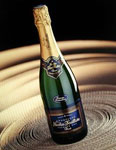 In
addition to Victoria’s actual birthday, next Saturday sees a $3 price
reduction in the popular Nicolas Feuillatte Brut
Reserve Particuliere Champagne, which drops to $38.95 (General List).
This straightforward, crisp, ripe red apple, easy-to-quaff style has its
admirers. Robert Parker, for
instance, gave it an astounding 92 points back in 1998, suggesting that he
would be well advised to stick to evaluating robust reds.
In
addition to Victoria’s actual birthday, next Saturday sees a $3 price
reduction in the popular Nicolas Feuillatte Brut
Reserve Particuliere Champagne, which drops to $38.95 (General List).
This straightforward, crisp, ripe red apple, easy-to-quaff style has its
admirers. Robert Parker, for
instance, gave it an astounding 92 points back in 1998, suggesting that he
would be well advised to stick to evaluating robust reds.
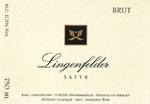 When
it comes to Sekt, regrettably, neither Albert nor Victoria had any German
bubbly to compare to Karl Lingenfelder Satyr
a new “methode Champenoise” Vintages
In-Store Discovery that was released last month at $36.95.
When
it comes to Sekt, regrettably, neither Albert nor Victoria had any German
bubbly to compare to Karl Lingenfelder Satyr
a new “methode Champenoise” Vintages
In-Store Discovery that was released last month at $36.95.
 Ron
Fiorelli,
director of the German Wine Information Bureau, brought this unique effort
to my attention. Rainer
Karl Lingenfelder, the idiosyncratic 13th generation owner of this
1520 estate, points out that in making Champagne, sugar is added at three
stages - first to the base wine increase alcoholic strength (called chaptalization);
second, to kick start the secondary fermentation (called triage);
and third, after fermentation when the yeast deposit is being removed
(called dégorgement) when a
sugar solution (dosage) is added
for sweetening purposes.
Ron
Fiorelli,
director of the German Wine Information Bureau, brought this unique effort
to my attention. Rainer
Karl Lingenfelder, the idiosyncratic 13th generation owner of this
1520 estate, points out that in making Champagne, sugar is added at three
stages - first to the base wine increase alcoholic strength (called chaptalization);
second, to kick start the secondary fermentation (called triage);
and third, after fermentation when the yeast deposit is being removed
(called dégorgement) when a
sugar solution (dosage) is added
for sweetening purposes.
Lingenfelder’s “non-intervention” philosophy focuses on “quality
wines of higher distinction (called Praedikatswein), which under German
laws are not allowed to be chaptalized. In other words, no sugar can be
added at any stage, meaning that the final wine is “a direct reflection
of site or terroir.”
To get the secondary fermentation going, freshly-pressed 1995 Riesling
Spätlese grape juice was added to the 1994
Riesling Freinsheimer Goldberg Kabinett base wine, which comes
from his own vineyatds. After 5 years on the yeast, the wine was disgorged
and fresh Riesling Spätlese juice from the 2000 vintage was added as a
dosage (again from his Goldberg vineyard).
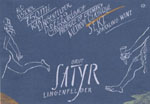 So how does it taste? Well this may well be
the Sekt of all Sekts. With 11.5% alcohol, good acidity and just a
hint of honeyed sweetness, it sings ripe Riesling. Deep yellow in colour,
the mouthfilling, zesty, ripe apricot and quince flavours go on and on.
Only a handful of cases of this perfect Sunday brunch partner are still
available. To see which LCBO stores have it in stock (Click
Here).
Rainer Karl Lingenfelder
created two labels for this wine and the one you find here in Ontario is
the subdued, more refined, classic edtion.
So how does it taste? Well this may well be
the Sekt of all Sekts. With 11.5% alcohol, good acidity and just a
hint of honeyed sweetness, it sings ripe Riesling. Deep yellow in colour,
the mouthfilling, zesty, ripe apricot and quince flavours go on and on.
Only a handful of cases of this perfect Sunday brunch partner are still
available. To see which LCBO stores have it in stock (Click
Here).
Rainer Karl Lingenfelder
created two labels for this wine and the one you find here in Ontario is
the subdued, more refined, classic edtion.
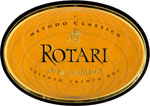 Finally
for bargain basement shoppers, an Italian best buy appearing in next
Saturday’s Vintages release is Rotari
Brut, which gives the classics a good
run for the money at $15.95. This dry, lively, crisp, bubbly blend of 90%
Chardonnay and 10% Pinot Nero is perfect for those who are more concerned
about what is in the bottle than on the label.
Finally
for bargain basement shoppers, an Italian best buy appearing in next
Saturday’s Vintages release is Rotari
Brut, which gives the classics a good
run for the money at $15.95. This dry, lively, crisp, bubbly blend of 90%
Chardonnay and 10% Pinot Nero is perfect for those who are more concerned
about what is in the bottle than on the label.
Upcoming:
Only
a few tickets are left for the Monday,
May 26th New Zealand Wine Fair,
which pairs fine food with some 100 exciting wines for $55 at Toronto’s
Alice Fazooli’s. For information (Click
Here).
Subscribe to Vintage Assessments Today • Click Here
|
Vintages June 2003 Release
|
Check out the
May
2003 InStore Discovery
Copyright Food & Beverage Testing Institute of Canada
2004
Prior written permission is required for any form of reproduction
(electronic or other wise) and or quotation.
Contact Michael Vaughan at
mbv@total.net